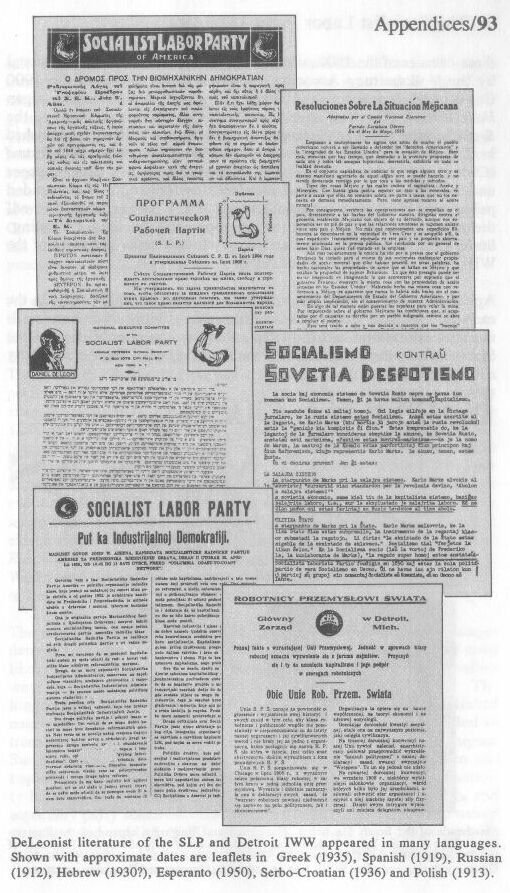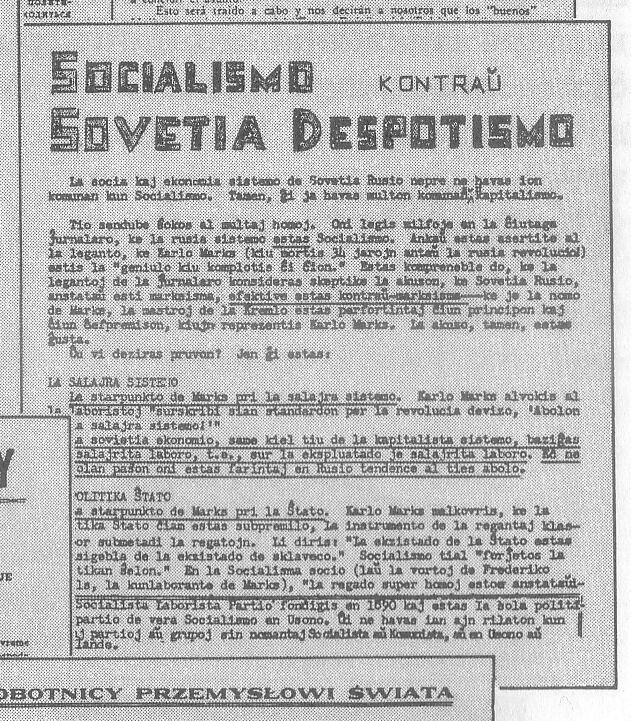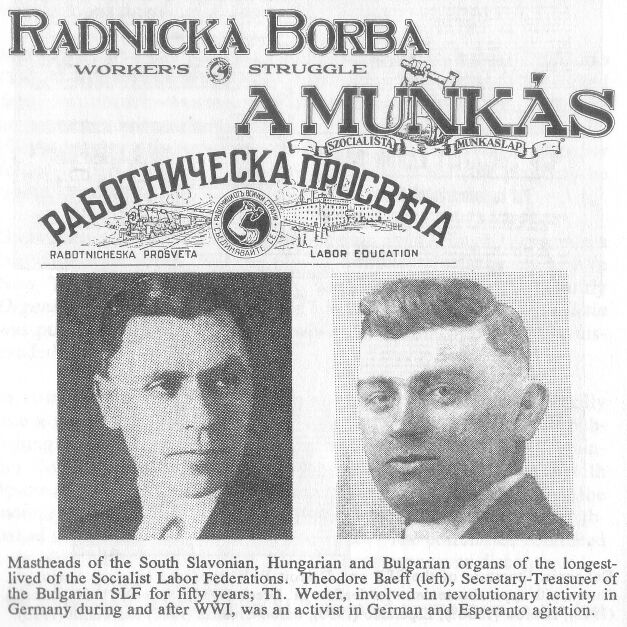
Appendices/93


[close-up view]
DeLeonist literature of the SLP and Detroit IWW appeared in many languages. Shown with approximate dates are leaflets in Greek (1935), Spanish (1919), Russian (1912), Hebrew (1930?), Esperanto (1950), Serbo‑Croatian (1936) and Polish (1913).
94/The Socialist Labor Party 1876‑1991
three decades of the 1800s was reduced to zero by the split engineered by the Volkszeitung Association, which in the words of the 1900 Convention Proceedings, "robbed the party of its German organ Vorwaerts." The SLP then launched a new German weekly, the Sozialistische Arbeiter Zeitung (Socialist Worker's Paper), published in Cleveland. In 1908 it combined with the Clevelander Volksfreund (Cleveland Friend of the People), Section Cleveland's German paper under the name Volksfreund und Arbeiter Zeitung. It suspended publication in 1918, a casualty of World War I. It was never revived, the need for a German SLP organ apparently no longer existing. Some German language SLP activity continued under the aegis of the WIIU until it too ended around 1924.
Agitation in the German language resumed after World War II. In the early fifties, Theo Weder, whose Esperanto activities made him familiar with conditions in Europe, pointed out the possibilities of the SLP's influencing a movement in the German Social Democratic Party

Mastheads of the South Slavonian, Hungarian and Bulgarian organs of the longest-lived of the Socialist Labor Federations. Theodore Baeff (left), Secretary‑Treasurer of the Bulgarian SLF for fifty years; Th. Weder, involved in revolutionary activity in Germany during and after WWI, was an activist in German and Esperanto agitation.
Appendices/95
called the Association Working for Scientific Socialism, with positions rather similar to those of the SLP. As reported in the 1952 national convention proceedings, contact had been made with the group. In the subsequent decade and a half, the party's German Committee carried on considerable agitation in the German language including the publication of a German organ, Das Bulletin, issued approximately quarterly and the translation of several SLP pamphlets into German. The failure to organize a German DeLeonist group and, after Weder's death, the declining health of Emil Teichert, the German Committee's mainspring, brought this agitation to an end in the late sixties. A total of forty‑four issues of the Bulletin were produced. At one point it had a circulation of three thousand.
As early as 1934 Theo Weder had written to the national office about the possibility of DeLeonist agitation within the largely European Esperanto movement. As an excellent Esperantist and a pioneer member of the radical Esperanto movement, Sennacieca Asocio Tutmonda (SAT, World Non-nationalist Association), Weder was in a position to promote DeLeonism in this medium. Beginning shortly after World War II, he and other SLP Esperantists began translating SLP articles for the SAT organ, Sennaciulo (One without Nationality), carrying on an enormous correspondence with interested Esperantists. The Esperanto Committee published at least one issue of a bulletin, Sciigilo De Leonista (DeLeonist Informer) in 1948. It eventually translated SLP pamphlets and leaflets and produced, in succession, a journal, La SLP Folio (The SLP Sheet), of which eleven issues were published, supplemented by at least three issues of Respondilo Deleonista (DeLeonist Answer Sheet). The death of Weder and the lack of concrete results also ended Esperanto activity in the late sixties.
The emphasis on the publication of newspapers in these languages derives from the fact that they are the fruits of language activity most likely to have been recorded. Actually, SLP pamphlets and leaflets were published in nearly all the languages mentioned above. The longer lasting federations, for instance, translated and published nearly every pamphlet of the Party. The Hungarians succeeded in translating and publishing the entire twenty-one volumes of Eugene Sue's Mysteries of the People, which Daniel and Solon De Leon had translated from French into English. Long after any organized activity had ceased in El Paso, the party translated SLP pamphlets and especially party statements into Spanish. Individual enthusiasts would translate and publish De Leon's works in their own language with NEC approval. Two of De Leon's speeches were translated into Rumanian under these circumstances.
SOURCE: Girard, Frank; Perry, Ben. The Socialist Labor Party, 1876-1991: A Short History. Philadelphia: Livra Books, 1991. 108 pp. Excerpt from Appendix C: SLP Agitation in Foreign Languages — Esperanto: pp. 93-95.
Esperanto & Laborista Movado / Esperanto & the Labor Movement
Esperanto Study Guide / Esperanto-Gvidilo
Home Page | Site
Map | What's New | Coming Attractions | Book
News
Bibliography | Mini-Bibliographies | Study
Guides | Special Sections
My Writings | Other Authors' Texts | Philosophical
Quotations
Blogs | Images
& Sounds | External Links
CONTACT Ralph Dumain
Uploaded 20 February 2009
Site ©1999-2009 Ralph Dumain